ETHIOPIA - BIFTU GUDINA LOT #10 - WASHED
Tax included
Shipping calculated at checkout
Out of stock
Pickup currently unavailable
SENSORY DESCRIPTION
TECHNICAL DESCRIPTION
| Package weight | 250g |
| Origin | Ethiopia |
| Area | Jimma |
| Cooperative/Farm | Biftu Circumcision |
| Microlot | Lot. 10 |
| Altitude | 2000m |
| Variety | Native variety |
| Process | Washed |
| Moisture | 10,1% |
| Density | 738g/l |
| FARMGATE PRICE* | €3.74 (paid directly to the collector) |
FULL DESCRIPTION
Derived from the Amharic language, Biftu Gudina means "ray of development". The cooperative was founded in 2012 and is located in the woreda (district) of Agaro - Goma, in the Jimma area. There are around 150 smallholders in total. Located near the town of Jimma, the cooperative benefits from high altitude and rich, fertile soils. The surrounding area is green and lush.
Biftu Gudina has strong leadership and a president who, together with Technoserve (an NGO that supports farmers in creating washing stations and new cooperative structures), he founded the cooperative. Initial funding came from Falcon Coffees. Since it was founded, Biftu Gudina has become famous in specialty coffee circles thanks to its incredibly complex and savory flavor and, as a result, is now fetching prices that farmers could only dream of in the past - up to four times more.
Processing:
Biftu Gudina coffee is processed using the washed method. In the washing station, the cherries are sorted by hand to identify unripe and overripe fruits before entering the hopper that feeds the Penagos eco-pulper. Next, the beans are immersed in clean water in concrete tanks for 8 hours. The wastewater treatment is based on a form of natural filtration through a patch of vetiver grass, before it ends up in the pits and finally in the ground. The beans are then sun-dried for 10-14 days on raised African beds and again carefully hand-selected.
*FARMGATE PRICE
The Farmgate price is ultimately the real price paid to the farmer who originally produced the coffee. Ultimately it is the most transparent price you can find.
The following costs must then be added to the Farmgate price before arriving at the roastery:
- Packaging costs
- Handling costs at origin
- Logistics costs (shipping and customs duties)
- Handling costs on arrival
- Customs clearance costs and phytosanitary controls in Europe
- Internal transport costs
How to choose:
NITROGEN AND VACUUM
Our packages are all packaged in a protected atmosphere (first under vacuum and then we insert nitrogen), using this particular technology which eliminates oxygen in the package, the coffee remains fresh for up to 3 months after roasting.
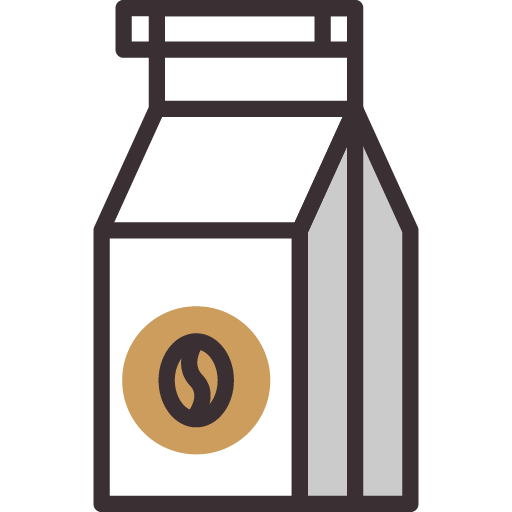
ROASTING
We roast in two different ways, dividing into two main groups, based on the type of extraction:
- Light: suitable for Filtro/Aeropress type extractions, or for those looking for a coffee with a note of strong acidity and many aromas.
- Medium: suitable for Espresso/Moka extractions, or for those who want a coffee with a much more intense flavor and a hint of bitterness.

GRINDING
There are dozens of different grindings, it can be said that each machine or equipment requires a specific grinding.
With us you can choose to buy ground coffee for Moka or Filter.
We have tried to summarize them as follows:
- Jug/Cezve:
- Espresso:
- Moka:
- V60 Filter:
- Chemex:
- French Press/Infusore:

HOW LONG DOES IT LAST?
Coffee has a limited shelf life when we talk about quality. Even if up to 24 months can be written on the label, generally high quality coffee has lost most of its flavor and aroma in a few months. We recommend drinking it between 10 days and 60 days after the roasting date (provided the bag has never been opened). When the bag is opened, the quality of the coffee always deteriorates rapidly and aromas and flavor are lost within a few days. Unfortunately, the roasting date is not always written, especially by larger companies. On our packages you will find it clearly written on the back.
P.S. our bags are all vacuum packaged with added nitrogen, which extends the potential shelf life of the product.
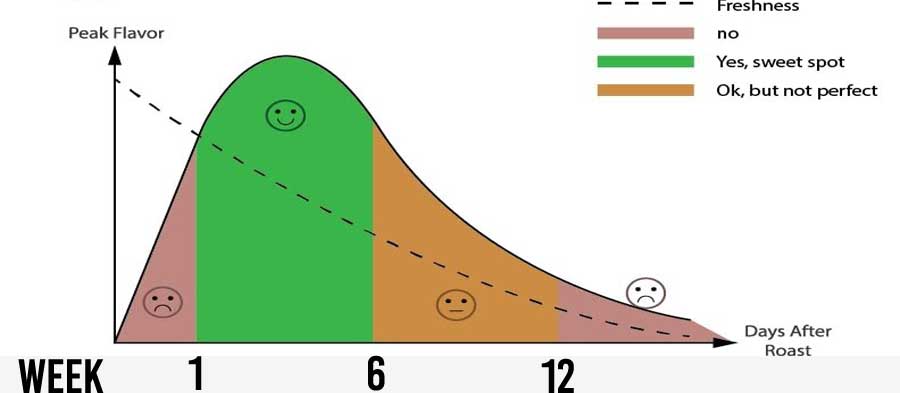
How to do:
ESPRESSO
Espresso requires some precision rules:
- Quality coffee
- Recommended roasting within 30-40 days
- Fine grinding
- Water temperature around 90-92°
- A single dose of 8-9g (double dose of 15-17g)
- Extraction time approximately 25 seconds
The use of quality espresso machines (range from €600 and up) can ensure a better result.
Preferably are machines that also have a coffee grinder to grind "fresh" coffee
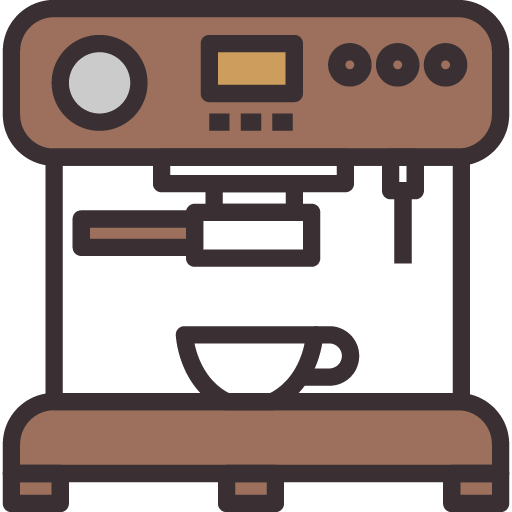
MOKA
The Moka requires a little attention:
- Use filtered or bottled water (NO TAP)
- Recommended roasting within 30-40 days
- Medium-fine grinding
- Fill the boiler with water without exceeding the valve
- Place the ground coffee into the filter without pressing or making any bumps, simply level it at the edge
- Place over medium heat
- Wait for the liquid to rise through the chimney, without letting it gurgle (TURN OFF AS SOON AS THE FLOW OF COFFEE BEGINS TO GO FAST AND COLOURLESS)
- Mix before serving
The Moka should only be washed with water and any neutral detergents (taking care to rinse carefully with water), never in the dishwasher or with abrasive sponges.
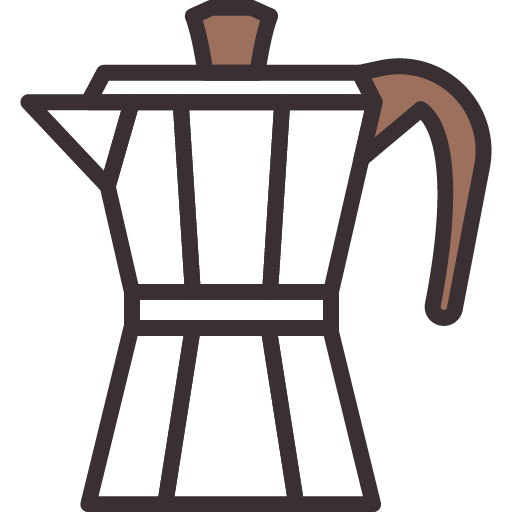
FILTER V60/CHEMEX
Filter or Chemex coffee requires precision in times and weights, some advice:
- Quality coffee
- Recommended roasting within 20 days
- Medium grind (medium-coarse for Chemex)
- Filtered or bottled water
- Water temperature of approximately 90-94° depending on the coffee used (generally those washed at higher temperatures)
- Approximately 15g of ground coffee for every 250g of water (Chemex at least 30g per 500g of water)
- Pre-infuse for 30-40 seconds by pouring hot water for double the weight of coffee used
- Pour the water in two or three steps as desired with a rotating direction, being careful not to create too much turbulence
- Contact/percolation time approximately 3 minutes (4-5 for Chemex)
A light roast is generally recommended for filter systems
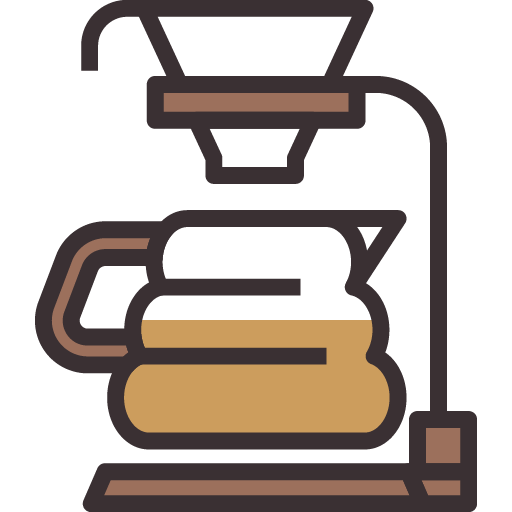
AEROPRESS
The Aeropress requires some precision rules:
- Quality coffee
- Recommended roasting within 20-30 days
- Medium grind (or as preferred)
- Use filtered water or bottle
- Water temperature around 85-90°
- A dose of approximately 17g per 200-220g of water
- Pour water for pre-infusion of 30-40 seconds
- Mix with the appropriate spoon
- Then pour in the remaining water and close the cap
- Turn the aeropress upside down and press firmly but steadily until extraction is complete
- Total contact/infusion time 2-3 minutes

OTHER SYSTEMS
There are dozens of different systems for extracting coffee, we have summarized the main ones here but if you need to know how to do the others not on the list, contact us


